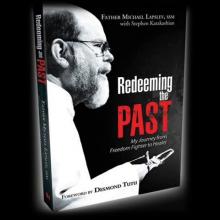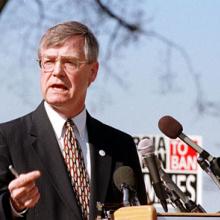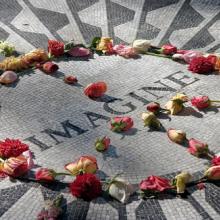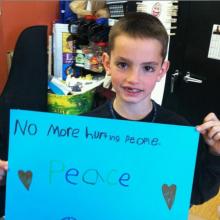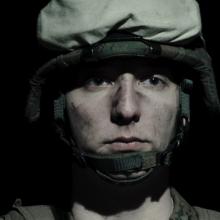Nonviolence
When a head of state is responsible for the deaths of 100,000 of his people and has used chemical weapons against innocent civilians — the world needs to respond. In one massive attack, the evidence appears to show that 1,429 people, including 400 children, suffered horrible deaths from chemical weapons banned by the international community. That is a profound moral crisis that requires an equivalent moral response. Doing nothing is not an option. But how should we respond, and what are moral principles for that response?
For Christians, I would suggest there are two principles that should guide our thinking. Other people of faith and moral sensibility might agree with this two-fold moral compass.
As the Obama administration considers a strike in response to recent chemical attacks, the head of a global evangelical group said Wednesday that Christians in the Middle East oppose military intervention in Syria.
“There is major consensus amongst the Christian leaders in this region that any military intervention would have a detrimental effect … on Christians in Syria,” wrote Geoff Tunnicliffe, secretary general/CEO of World Evangelical Alliance, in a letter to the State Department, the White House and the United Nation’s Security Council.
As I began my morning devotions on Tuesday this week, Syria was on my mind. No surprise, right? The debate about whether to respond militarily to the use of chemical weapons is all over the news right now. Mostly folks are arguing about what actually happened and the larger geopolitical questions that a military strike involves, which are important and necessary issues. But here’s the question that was rattling around in my head as I turned to the day’s devotional readings on universalis.com: How does one respond to violence without becoming as guilty as the perpetrators you seek to punish?
As the United States prepares to “officially” become involved in the Syrian war, Christian pacifism has reemerged as a much-discussed and relevant topic. Unfortunately, the concept has been somewhat misrepresented, undervalued, and often downright demonized within evangelical communities.
Critics often assume Christian Pacifism is some sort of radical political movement associated with marijuana-smoking hippies who are anti-government conspiracy theorists. To make matters worse, pop-culture (and much of Christian culture) has made pacifism seem, well, passive — as if pacifists are unpatriotic and un-American heretics who refuse to enlist in the military and avoid physical confrontations at all costs. They are characterized and perceived as weak, scared, and gutless.
In reality, the beliefs that form Christian pacifism are spiritual and scripturally founded around the life of Christ. And whether you agree with the theology, it’s hard to passively dismiss the Biblical argument for pacifism as some sort of crazy mumbo-jumbo.
As the Obama administration readies for a probable military strike against Syria, Religion News Service asked a panel of theologians and policy experts whether the U.S. should intervene in Syria in light of the regime’s use of chemical weapons against civilians. Would the “Just War” doctrine justify U.S. military action, and what is America’s moral responsibility? Here are their responses, which have been edited for clarity.
On Wednesday, President Barack Obama said that if Bashar al-Assad used chemical weapons against innocent civilians, there must be “international consequences.” The president is right. But what should those consequences be?
The issue here, again, is one that we have not decided how to deal with: terrorism. The definition of terrorism is deliberate and brutal attacks upon innocent people — whether by individuals, groups, or heads of state. By that definition, Assad is a terrorist. And terrorists who possess weapons of mass destruction and demonstrate their willingness to use them are most dangerous ones. But how should we respond?
I am in in the U.K., where political leaders last night backed off the decision to make immediate “military strikes” while the U.S. and other nations are considering them. The feeling here is that international and legal legitimacy need to be established first, that the U.N. inspectors should finish their examinations in Syria before any actions are taken, and that all other means of response should be fully explored first. These are good decisions.
Why is there such public “war fatigue” in the U.K. and the U.S. in light of Iraq and Afghanistan — and why is that creating reluctance to more military action? Because wars and military solutions have FAILED in response to terrorism — failed to achieve what they were purported to do.
We’ve spent the last few days recalling the anniversary of the March on Washington and listening again to the Rev. Martin Luther King, Jr., talk so powerfully about his dream of a land that is full of love and free of hatred. Stirring words. Inspiring words. Spirit-infused words. We’re also reminded that they’re only words until they produce action.
It’s one thing to be inspired when we hear something, another thing to respond to the inspiration and to do something.
Powerful words play a big role in our lives, challenging us and leading us. God is love. Love one another. Be compassionate. Love your enemies. Whatsoever you do to the least. Your brother‘s keeper. An instrument of your peace. Give to all. The moral arc of the universe is long, but it bends toward justice. Blessed are the poor. All men are created equal. The common good. Government of, by and for the people. I have a dream. Be the change. Make justice a reality for all God‘s children.
Those and so many other words inspire us to raise our lives and our world to new heights. But they remain words until we commit ourselves to live them. Then they acquire real power.
“Blessed are the peacemakers, for they will be called the sons [and daughters] of God.” Matthew 5:9
The news cycle, the blogosphere, and social justice advocates often focus upon crisis, tragedy, and pain. Moments of freedom, of healing and hope are often drowned out by the cacophonous sounds of self-interest, fear and danger. Today I’d like to silence that cacophony and trumpet loudly about the brave and humble Antoinette Tuff, a peacemaker filled with the Spirit of God, who faced a gunman with her arsenal of love and compassion and saved a school full of children.
Antoinette Tuff’s faith and courage changed the outcome of history on Tuesday, Aug. 20. It is a day that will not live in infamy. Unlike other days that started on a similar path to violence, families did not grieve the loss of their children to the would-be mass gunman who walked into an elementary school with almost 500 rounds of ammunition. Police were scrambled to the scene, but did not have to evacuate classrooms of frightened children watching for a shooter. In fact, despite the heavily armed suspect and a heavily armed law enforcement response, not one person lost their life.
Upon my recent return from the Middle East (with The Global Immersion Project), I was struck more than ever before at our Western infatuation around military aggression, violence, and division. Not only are these the primary narratives we are fed through our major media outlets, they are the narratives we subconsciously embrace through the latest bestseller, box office hit, or video game. Violence, death, and division have become normative. We are becoming numb to the very things that we – as ambassadors of hope and reconciliation – are to turn from as Resurrection People. It is as though there is a stranglehold on our on our ability to see and participate in the stories of healing and new life.
As surprising as this may be, embedded in the midst of these conflicts are endless stories of hope that never make the latest headline or sound bite. And in the times I've followed Jesus INTO these places of conflict, I continue to encounter stories of peace and hope that embody the Gospel message, stories by real people, happening right now, in places usually known only for conflict, violence, and death.
...The army is used as "an institution that promotes social cohesion" and a "principal place" of forming national consciousness and participating in the nation building project "as conceived by the authorities, i.e. promoting Israel as a Jewish national state". In this perspective, according to the Justice and Peace commisssion operating in the Holy Land, "talk about drafting of Christian Arabs rather than the Arabs in general - Muslims and Christians - is clearly an attempt to drive a wedge between Christians and Muslims in Israel". On addressing these delicate problems, the Church should keep in mind that "the army is used as a means of imposing and maintaining the occupation of Palestinian territories and thus preventing Palestinians from achieving dignity and independence". The army is primarily "an army of aggression rather than an army of defense". Therefore "the use of army service to divide the Arab population against itself is detrimental to the interests of the Arabs as a community."
PRESSURE IS BUILDING for the United States to become militarily involved in the Syrian civil war. The result would be further bloodshed and destruction for the people of Syria, the worsening of an already grave regional security crisis, and U.S. involvement in another Middle East war.
The Obama administration has apparently decided to provide arms to the rebels. Sen. John McCain and others in Congress are calling for a no-fly zone and air strikes against Syrian government targets. The increased hard line comes in response to allegations that Syrian government forces have used chemical weapons, crossing the “red line” President Obama warned against—although reports have surfaced that rebel forces also may have used chemical weapons.
Concerns about the use of chemical weapons are serious, but they are not a justification for military action that could drag U.S. forces into the deadly civil conflict. Bombing strikes would not be sufficient to neutralize Syria’s vast arsenal of chemical weapons, and they could cause chemical explosions that would release the deadly toxins we seek to contain.
For a military operation to achieve results, it would have to be a large-scale undertaking. Creating a humanitarian safe zone or attempting to impose a no-fly zone would require a major commitment of allied forces and would lead to serious military confrontation with hostile Syrian forces.
Last year, 506 murders happened in the city of Chicago — the majority of them in black communities. Similar rates of violence swept through places like Philadelphia, Camden, N.J., New Orleans, and the list could go on and on. I have in my life begun to declare myself a pacifist. I have made this change because I think, as a black man, the only recourse for me is to try and stop violence that happens in so many black communities. Turning the other cheek, responding with a gentle answer, forgiving a misunderstanding: these are the paths to recovery in my neighborhood.
The “if someone hits you, hit them back” mentality is destroying black men at an alarming rate. Dads, teach your boys to talk it over, look the other way, or keep walking when things begin to escalate.
Most Americans sat glued to the TV or radio on April 15 (or raced to finish tax returns) transfixed by the horrific Boston Marathon bombing and aftermath. Nearly 100 friends of Fr. Michael Lapsley’s gathered that evening at Busboys and Poets restaurant and bookstore in Washington, D.C., to be soothed with a testimony of faith by South African Ambassador Ebrahim Rasool, soul-stirring cello music, and a transporting testimony of healing by apartheid regime bomb victim “Father Mike.”
One of my favorite newspapers in the world, the South African Mail and Guardian, reported on April 19 this way:
“Boston bombings: the marathon struggle of survival and healing … a priest from South Africa, apartheid fighter and a bomb victim himself reaches out to Americans about forgiveness … He had not planned it that way. The event was to launch his book. It had been scheduled for last October but Hurricane Sandy scuppered those plans. Instead it took place on a day when three people were killed and more than 100 injured in Boston.”
The Rev. Bob Edgar, a Democratic congressman and United Methodist minister who went on to lead the National Council of Churches through a painful series of restructuring, died suddenly Tuesday at age 69.
The man religious leaders remembered as a “bridge builder,” suffered a heart attack and had been exercising on a treadmill in his home in Burke, Va., said Mary Boyle, spokeswoman for Common Cause. Edgar became president of the Washington-based nonpartisan advocacy group in 2007 after serving two terms as the general secretary of the NCC.
“He was a man of great capacity who understood the importance of cross-cultural and religious dynamics,” said the Rev. Carroll Baltimore, president of the Progressive National Baptist Convention, who recalled traveling in a Common Cause interfaith delegation Edgar led to Vietnam in 2010 to learn about continuing effects of Agent Orange.
Baltimore said Edgar brought together Christians, Buddhists, Confucians, and political leaders.
“He was able to link all of those pieces together and just remind us that we’re all made from the same cloth,” he said.
The question for me as a teacher is not so much "What could have been?" as it is "What can be?"
I think of my fourth grader holding signs that say, "I am MLK," "I am Anne Frank," "I am Harvey Milk," "I am Daniel Pearl," "I am James Byrd, Jr.," "I am Matthew Shephard," and "I am Yitzhak Rabin." Though she cannot really be them, she certainly can take up their work and carry it on in her own life. She wants to become a doctor so she can help people live. With that spirit, she will help these martyrs live, too.
As a teacher, it is my job not only to help students imagine a world without hate, but also to help them find the tools and the heart to build it.
I woke up this morning, like everyone else, to the news of a shootout with one suspect in the Boston Marathon bombing and the ongoing manhunt for a second brother. Like many others, I’ve heard lots of misinformation over the past few days about whether officials did or didn’t have a suspect, whether they did or didn’t have them in custody, and so on.
“I heard someone dropped a bomb on Boston,” said Mattias, my 9-year-old son, over breakfast while I scrolled through the breaking news reports.
“Not exactly,” I said. “It was two guys. Two brothers who came from [another country] to go to college at MIT.” They put homemade bombs in and around trashcans by the finish line of the marathon.”
“Why?” he asked.
“I really don’t know.”
“Maybe they were angry about something, and they didn’t know how to talk about their feelings.”
“Maybe so,” I nodded.
“Did they hurt people?”
The Boston Marathon bombing is so shocking because it was obviously done by someone(s) who wanted to prove something not to themselves, but to others. Could they display to the world his repressed rage enough? Could they divert attention to their cause enough? Could they maim and kill the innocent for some misguided agenda enough? That is what makes this act of terrorism so terrifying: a sick person or people trying to prove something to others by targeting those who are simply proving something to themselves, or trying to do something for others. It is jarring.
Ninety minutes before the bombs detonated, I was concluding a presentation on Jesus’ parable of the Good Samaritan. That recent immersion into Luke’s narrative shaped my video viewing of the bombing’s aftermath. The one who “fell into the hands of robbers” was everywhere. The assaulted and bloodied were scattered by the side of the road, in this case, Boylston Street. Instead of people passing by on the other side, however, it was quite the opposite. Spectators and emergency medical personnel waded into the grisly scene and treated the wounded with exquisite care.
My Uncle Norman fought in Europe during World War II. An artillery observer, he didn’t return with many “heroic” stories to tell. When I was little, he would roll out some souvenirs from the war, and I’d be impressed: German military dress knives and lovely table linens. I don’t recall all of the stories or how these things became his, but I’m pleased to report the table linens were a gift. His war experience was hardly glamorous.
Uncle Norman did tell of one harrowing experience. He and his partner were identified by German artillery, and they experienced exactly the treatment they dished out. Out in front of their own unit, as they always were, they heard a shot go just overhead and explode behind them. Then one fell just short. Placing a shell a bit to the left and one to the right, the Germans had them zeroed in. Uncle Norman’s friend panicked, frozen, stuck to the ground. And in the last minute – as he remembered it – my uncle tackled his partner and carried him to safety. Pretty dramatic stuff for a kid to hear.
When Uncle Norman was much older, he came close to death after gall bladder surgery. That night he experienced profound nightmares, the Lady Macbeth experience of bloody hands he could not cleanse. The next day, he told me a very different story than the ones I’d heard before. I believe I was the first to hear of the time when he called in the coordinates for an intersection across which a significant body of Germans was crossing. For 30 minutes, he said, he watched the effects of the barrage he had targeted. And now, 40 years later, his hands wouldn’t come clean.
"They look like big, good, strong hands, don't they. I always thought that's what they were. Ahh, my little friends, the little man with his racing snail. The nighthawk. Even the stupid bat. I couldn't hold on to them. the Nothing pulled them right out of my hands. I failed." -Rock-biter, in The Neverending Story
In the movie The Neverending Story, there's an alternate reality called Fantasia made up of all the hopes and dreams of humankind. But gradually people have stopped believing, hoping, dreaming, and wishing. And so a mysterious someone seized the opportunity and unleashed a dark void that gradually devours all the beautiful creations. The Nothing. The creatures of Fantasia are powerless to stop it. Why was the Nothing unleashed?
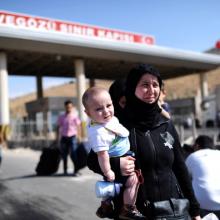

![Pope Gregory the Great, Carlo Saraceni [Public domain], via Wikimedia Commons Pope Gregory the Great, Carlo Saraceni [Public domain], via Wikimedia Commons](https://sojo.net/sites/default/files/styles/medium_square/public/blog/Gregorythegreat.jpg?itok=5WShJkFj)
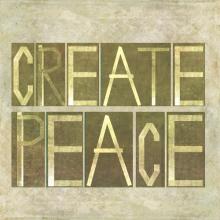

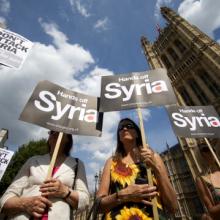
![President Lyndon Johnson and Martin Luther King, Jr. By Yoichi R. Okamoto [Public domain], via Wikimedia Commons By Yoichi R. Okamoto [Public domain], via Wikimedia Commons](https://sojo.net/sites/default/files/styles/medium_square/public/blog/512px-Lyndon_Johnson_and_Martin_Luther_King%2C_Jr._-_Voting_Rights_Act.jpg?itok=z3qvpwpZ)




